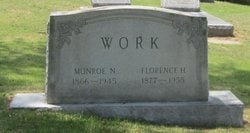GM – FBF – Today’s American Champion was an African-American sociologist who founded the Department of Records and Research at the Tuskegee Institute in 1908.His published works include the Negro Year Book and A Bibliography of the Negro in Africa and America, a bibliography of approximately seventeen thousand references to African Americans.Today in our History – December 26, 1904 – Monroe Nathan Work – Creates The Negro Year Book. Work was born to former slaves in Iredell County, North Carolina, and moved in 1867 to Cairo, Illinois, where his father pursued farming. At the age of 23, Work entered Arkansas City High School (Kansas), an integrated high school in Arkansas City, Kansas. He graduated 3rd in his class, and after undergoing training at the Chicago Theological Seminary, he enrolled in the University of Chicago to become a sociologist. He did research on the correlation between the highest crime rates among blacks and the large proportion living in slums. His paper on the subject would become the first article published in the American Journal of Sociology by an African American. He finished school in Chicago with a Bachelor of Arts degree in Philosophy and a Master of Arts degree in Sociology. After graduating in 1903, Work moved to Savannah, Georgia, to become a professor at Georgia State Industrial College. He married Florence E. Hendrickson of Savannah on December 27, 1904, and they had no children. In July 1905, Work attended the conference of the Niagara Movement at the invitation of W. E. B. Du Bois.In 1908, he accepted a proposal by Booker T. Washington to found the Department of Records and Research at the Tuskegee Institute. While there, he would begin the Negro Year Book, a publication that incorporated his periodic summation of lynching reports, which resulted in the Tuskegee Institute becoming one of the most quoted and undisputed sources on this form of racial violence.According to Work’s biographer, these resources were the largest of their kind in an era when scholarship by and about black Americans was highly inaccessible, and overlooked or ignored by most academics in the US. Work received the Harmon Award in Education in 1928 for his research and involvement in the Negro Year Book and his work on A Bibliography of the Negro in Africa and America.In 1918, he was elected to the American Negro Academy, which was the earliest major African-American learned society.Work died of natural causes in Tuskegee in 1945. Make it a champion day!

